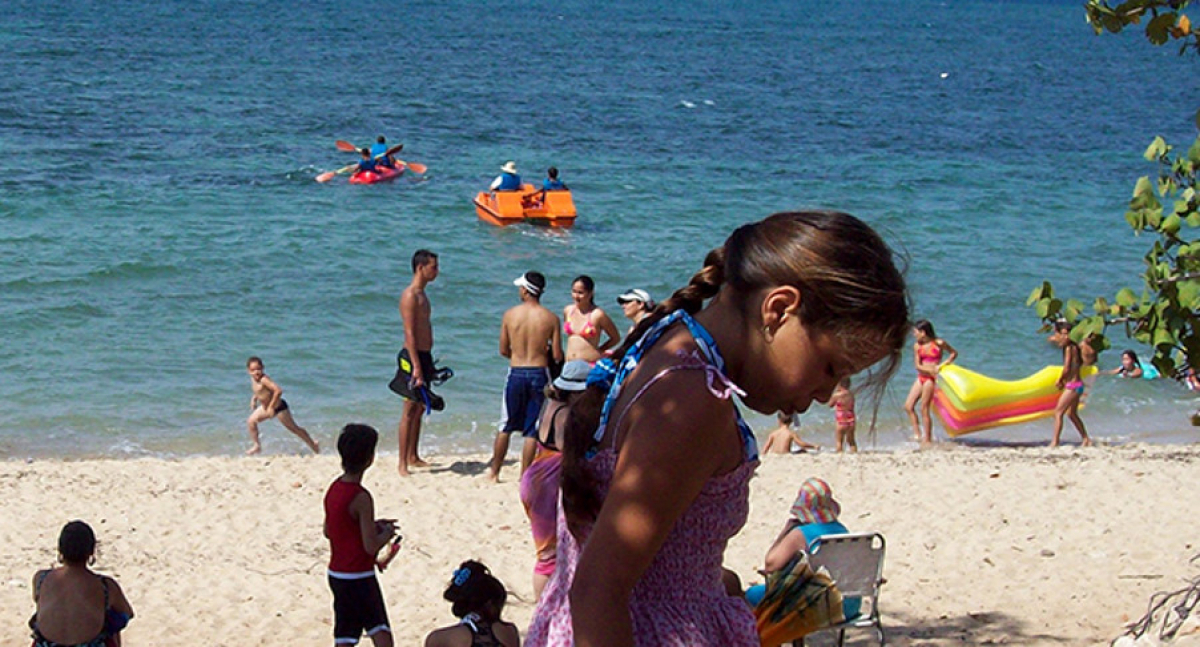Ronald and Pichy, two friends ages 19 and 21, respectively, work as counter clerks at private coffee shops. In the last few months they have been saving up money to enjoy during their summer, and now they are taking stock of their efforts.
"Of course, it's not enough for what we'd like," says Pichy, who dreamed of going to Varadero for two weeks, far beyond his budget, like that of most Cubans.
A more affordable beach option, a campsite, "no longer has that appeal or variety from the times of our parents," he laments.
Early last May, the Campismo Popular group opened its offices in each municipality of the country to take reservations. The vice-president of this entity, Gabriela Molina González, said that, "depending on the conditions of each facility", they would guarantee horseback riding, diving, hiking and cycling.
Lidia Marta Núñez, the grandmother of four children, has always been an enthusiast of campsites, so she knows that there is a far cry between what they announce and the reality that campers later find at the more than 80 facilities on the island.
"I doubt that this year things will be different from previous years, because the current economic situation in the country is much more serious," says Núñez. "To say that this will be the best summer in history is quite absurd," she stated, in reference to a government official's claim.
In the last 10 years, Núñez has chosen the campsite as an option to enjoy a few days of summer with his family, "and we have never been able to dive, hike or ride horses".
Under the slogan "Summer 2019: Live It", the Government set up a working group that, according to the official press, "considers recreation for the people a priority."
As every year, the authorities involved schedule courses and workshops in the Youth Computer Clubs, video rooms and cultural centers. A tour of more than a dozen Havana communities revealed that these types of activities are not in line with the population's demands for the summer season.
"In fact, they are the least popular activities among the people," confirmed Rosita, a People's Power representative in a district of the municipality of Cerro.
Amidst all the din from three of her eight grandchildren, she says that not even the Rutas y Andares (Routes and Walks) project, promoted by the Office of the City Historian, is a recreational offer that Havana residents or visitors from other provinces value in their summer planning.
"Creating a working group to plan how Cubans will spend their leisure time in the summer is already quite questionable," says Armando, her husband, a retired Armed Forces officer.
He agrees, like other Havanans consulted, that a population's recreational options "should arise through the creativity of the service sector, not a centralized task by the Party."
Such is the result of bureaucratizing and politicizing the issue: offers to mollify and please the authorities, not Cubans.
Salaries vs the summer
The relationship between service and prices in summer deals is the concern that pervades Havana households. How to entertain and where to take the children during their vacation months is an annual headache for parents, aunts and uncles, and grandparents.
"A simple outing with two children to an amusement park can be equivalent to an average monthly salary," complains Tamara Figueredo while waiting in the El Curita park, in Havana Centro, for a bus to take her nephews, Lieter and Oscarito, to the Lenin Park. Given the desperation of her two children and the sweltering sun, she decided to rent a private car, which entailed a round-trip cost of six CUC.
The Government work group, in charge of deciding which activities and services to promote for the summer for Cubans, did not even mention the network of amusement parks controlled by the State.
"I suppose it was out of shame, because the conditions at children's recreational centers like the Zoo, Coney Island and Lenin Park itself, are dreadful," added Figueredo, recognizing that they are usually the cheapest options.
Excursions to beaches and swimming pools, given the Cuban climate, are the most popular options between the months of July and August. Havanans' hope, since the Government says that it is committed to making this "the best summer in history", is at least to have decent transport services.
"If they do not reinforce State transportation, simply going to the beach becomes a luxury, because the cost with the taxi drivers is 2 to 4 CUC per person, depending on how busy they are," says Sergito, a plumber and father of three minors.
Sergito's wife, Omara, points out that a trip to the beach also involves a set of expenses that make one think twice.
"Renting a lounger and an umbrella is very expensive, instead of being a simple service, not to mention the food. How many times can a family of five afford to go to the beach in two months? That's what must be calculated," Omara explains.
Dianelis and Cheli were lucky this year. Each one was able to make two trips to Mexico, as mulas, importing and selling items. They decided to invest part of their earnings in renting a house on the beach to enjoy with their families.
"The State barely rents houses on the beach to Cubans, it's a business that is almost entirely in the hands of private companies," Cheli says. The cost he reveals is downright shocking: 60 CUC for a two-bedroom house in Brisas del Mar.
"I think that every Cuban deserves a week in a house on the beach, but very few can afford it," says Dianelis.
The best summer in history, in the midst of an economic crisis that has caused, among other things, an increase in prices, "remains to be seen and will depend more on Cubans' imagination than the Government's plans," concludes Cheli.
